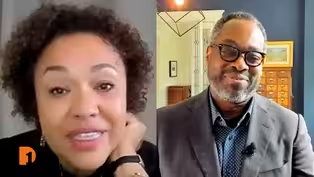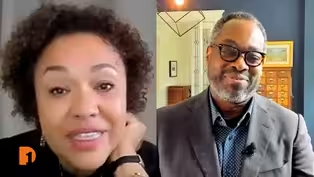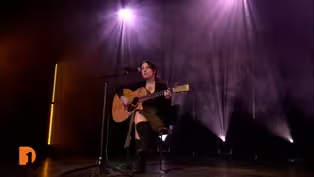
NEA chair, Armenian music, Weekend events, Singer Emily Rose
Season 8 Episode 3 | 26m 46sVideo has Closed Captions
Dr. Maria Rosario Jackson, Armenian music, One Detroit Weekend, and singer Emily Rose.
National Endowment for the Arts Chair Dr. Maria Rosario Jackson heads to Detroit to talk about the importance of the arts in building healthy communities. Hear from the filmmakers behind the documentary “We Thrive,” a film that celebrates and chronicles the history of Armenian music in Detroit. Plus, plan your weekend events with “One Detroit Weekend” and singer Emily Rose performs “Alma.”
Problems playing video? | Closed Captioning Feedback
Problems playing video? | Closed Captioning Feedback
One Detroit is a local public television program presented by Detroit PBS

NEA chair, Armenian music, Weekend events, Singer Emily Rose
Season 8 Episode 3 | 26m 46sVideo has Closed Captions
National Endowment for the Arts Chair Dr. Maria Rosario Jackson heads to Detroit to talk about the importance of the arts in building healthy communities. Hear from the filmmakers behind the documentary “We Thrive,” a film that celebrates and chronicles the history of Armenian music in Detroit. Plus, plan your weekend events with “One Detroit Weekend” and singer Emily Rose performs “Alma.”
Problems playing video? | Closed Captioning Feedback
How to Watch One Detroit
One Detroit is available to stream on pbs.org and the free PBS App, available on iPhone, Apple TV, Android TV, Android smartphones, Amazon Fire TV, Amazon Fire Tablet, Roku, Samsung Smart TV, and Vizio.
Providing Support for PBS.org
Learn Moreabout PBS online sponsorship- Transitioning to our, our- - Coming up on "One Detroit."
The Chair of the National Endowment for the Arts talks about the importance of the arts in building healthy communities.
Plus a new documentary shines a light on the eclectic mix of Armenian American musicians in Metro Detroit and the common bond they share.
Also ahead, we'll give you some ideas on how to spend the weekend and beyond in and around the city.
And a performance by award-winning Detroit singer and songwriter, Emily Rose.
It's all coming up next on "One Detroit."
- [Reporter] From Delta Faucets to Behr Paint.
Masco Corporation is proud to deliver products that enhance the way consumers all over the world experience and enjoy their living spaces.
Masco serving Michigan communities since 1929.
Support for this program is provided by the Cynthia & Edsel Ford Fund for Journalism at Detroit Public TV.
- [Announcer] The DTE Foundation is a proud sponsor of Detroit Public TV among the state's largest foundations committed to Michigan focused giving.
We support organizations that are doing exceptional work in our state.
Visit DTEfoundation.com to learn more.
- [Reporter] Nissan Foundation and viewers like you.
(upbeat music) - [Will] Just ahead on this week's "One Detroit."
We'll hear from the film makers behind a documentary that ties the traditional music and instruments of Armenia to the diverse music of local Armenian Americans today.
Plus Dave Wagner and Peter Whorf of 90.9 WRCJ offer suggestions on events to take in this weekend.
And Detroit vocalist Emily Rose performs her newest single "Alma."
But first up, the Chair of the National Endowment for the Arts is coming to Detroit for a community conversation about living an artful life.
Dr. Maria Rosario Jackson is the first African American and Mexican woman to chair the NEA.
She will sit down with the president of the Charles H. Wright Museum, Neil Barclay on Friday July 21st, as part of the Detroit Concert of Colors.
"American Black Journal" host and "One Detroit" contributor, Stephen Henderson, spoke with Dr. Jackson in advance of her visit to the museum.
- It started at home.
(gentle music) - Talk about what you'll talk with Neil about and what you're up to at the NEA.
- So I think we're gonna have a really good conversation about the importance of the arts in people's lives, the importance of museums, particularly museums like The Wright Museum.
I'm hoping to, to share what I'm up to at as Chair of National, the National Endowment for the Arts, as well as hear from Neil about the work that's happening in Detroit at The Wright Museum.
So I'm very excited about the conversation.
- Yeah, so tell us what you are up to at the NEA, really important, most really important institution in terms of, I feel like, you know guarding the arts maybe is the phrase that I would say.
You know, making sure that this is perpetuated and made available, accessible to so many different people.
And to places where without the NEA you might not have the same kind of awareness and access to the fine arts.
- Well certainly accessibility is a really important part of what I'm committed to in this role as leader of the organization.
There's a concept that I've been promoting that has to do with making the arts part of our everyday lived experience.
And I talk about artful lives and our intention to make sure that everyone in the country has an opportunity to have art in their lives.
And it's an elastic notion from my perspective which includes the things that people will usually think about which might be going to a museum or a concert, or seeing a play.
I think it also includes though, everyday lived experience and practice in actively creating art at whatever level.
So whether it's making, doing and teaching, learning, the aesthetic qualities of being in family, being in community, those are all really important.
So it's an elastic definition that I think has a lot of on-ramps for people to nurture their creative side and be expressive as full humans.
- Yeah, yeah.
So I, when I think about my own early exposure to the arts and things that made me love art and music, and museums, and all of the things you were just talking about, there are a couple spaces that come to mind.
And of course, school.
After school, right?
After school programming which was a really big deal when I was a kid in the latchkey era.
And then I think of summer programming through rec centers and other things that, you know my parents made sure I participated in.
And if you think of those two things or all of those things, a lot of 'em don't exist in the abundance that they did when I was a kid.
Some of 'em don't really exist at all and the ones that are left are under real threat.
I mean, we have a real struggle right here in the city of Detroit, to make sure that the arts are part of the public school system.
I mean, that, that it's not a given anymore.
I imagine that from your chair some of what you're dealing with is just the, the retraction of opportunity, the diminishment of that that opportunity for people to become fans of the arts in the way they used to.
- I think that there's, I think that there, the trends that you point to are on point in many places.
I also feel like there's a lot of opportunity right now to think more expansively about the role of the arts at the intersection of other fields.
You mentioned education.
I certainly think about education, I also think about health and community development, and how the arts are imperative to do well in any of those fields.
I mean, I personally think that the arts are often a precondition for so many of the things that we say we aspire to as a nation of opportunity and justice.
We just can't achieve it without figuring out how to integrate arts, culture and design into so many facets of our lives, so many different areas of policy and practice.
So I'm very interested and excited about the opportunity to more intentionally look at the connection, say between arts and health and wellbeing, or arts and how we think of healthy communities, how we continue to develop communities in ways where all people can thrive.
I think the arts are central to that.
- Yeah, yeah.
Let's talk a little about you and your background and what brings you to this position.
It is a milestone, an important milestone and the fact that you're sitting in the seat you are.
- Well, I mean, it's been a journey that has a through line.
And I think the through line is that I really do believe that the arts are critical to building healthy communities where all people can thrive.
And you know, my commitment to the arts started early and it started at home.
And it wasn't because my parents were artists or benefactors, or collectors or anything like that.
But I think that my parents resorted to the arts as a way to help my brother and me understand who we were and where we came from.
I think they also looked to the arts as a way to make sure that we were proud of the cultures that we came from, that, that we knew knew that we were connected to people who were capable of genius.
And that was really important to them.
And not to just know it intellectually, but to feel it.
So, and which is, you know, what happens through the arts when we get to express our full humanity.
So, I think awareness that the arts are essential to expressing that full humanity, to reclaiming that full humanity.
I think that, that has always informed my understanding of the kinds of cities and towns, and communities that I wanna participate in helping to build.
So my, you know, professional training is in urban planning.
- Right, right.
- But in all of that, I don't see the arts as separate from that.
I see it as essential and perhaps too often not considered enough.
But essential and certainly inadequate without the inclusion of arts, culture and design.
- [Will] And the conversation with Dr. Maria Rosario Jackson takes place at 10:00 AM, on July 21st at the Charles H. Wright Museum.
The event is free, but you must register at thewright.org.
Let's turn now to a documentary celebrating the history and culture of Armenians and Armenian Americans.
The film is titled, "We Thrive" and it focuses on the various kinds of music made here in Detroit by the Armenian community.
The directors, Lisa Hagopian and Eric Harabadian are part of the local music scene.
They gave "One Detroit" a preview of the film.
(gentle music) (upbeat Armenian music) - [Lisa] Local guitarist Sean Blackman performs in Armenian inspired tune.
Our latest film about the Motor City music scene is, "We Thrive."
Our previous films, "Nothing but Music," followed working class musicians.
And "Paradise Boogie" took a look at the Detroit blues scene.
- I've been playing electric guitar in the band Chain Reaction doing classic rock and blues for over 30 years.
I've been around Armenian music most of my life but I never really thought about playing it until now.
- [Lisa] Armenians have been in Detroit since the very late 1800s, after the Armenian genocide, many more arrived.
My own family has been here for over a hundred years.
- [Eric] Despite Armenian's tragic history, we've always thrived by way of music, classical, jazz.
(upbeat guitar music) Traditional folk.
(upbeat folk music) Blues, hard rock and every other genre.
My mother was German and my father was Armenian.
When you make a film like this, you really take a deep dive into your heritage.
It's made me think a lot about the blending of those two cultures.
In particular, I always felt like a fish outta water, yet I had a strong affinity to being Armenian at the same time.
And whatever I was going through in my life, music has been there for me.
(upbeat clarinet music) - I did my public school education in Detroit.
I did my secondary education at Cass Tech in Detroit.
That was the time that Harry Begien was band director at Cass Tech.
(exhilarating band music) Everything that transpired at CassTs was next to professional level.
Of course, that we were kids, we were fearless.
Diana Ross came from Cass Tech.
Dennis Edwards, one of The Temptations was in my classes you know, so it was a school that fed the music industry whether it was classical music or pop music.
- [Eric] Juilliard trained clarinet virtuoso, Hachig Kazarian who has entertained thousands nationwide talks about some influences on Armenian music.
- As a nationality that live surrounded by Muslims, there had somehow to intermingle with the Muslim, the Turk.
There has to be Armenian music that got projected there and Turkish music that got projected to the Armenian.
So there is some similarity.
Some Armenians don't like to hear music that has that Middle Eastern sound.
Armenian church music is a very pure Armenian music and a lot of our music sounds Middle Eastern.
People will identify Armenian music with the mass, the Badarak on Sunday.
- [Vaughn] In the Middle East, the oud is considered the queen of all instruments.
- [Eric] Community leader, radio show host and entrepreneur, Vaughn Masropian is also a vocalist, oudist and percussionist.
♪ Opa ♪ Vaughn, you've been a percussionist and vocalist with a band the Johnites.
- Actually the Johnites have been around for over 52 years.
I fell in love with the oud, very, very light instrument.
It has 11 strings and this is a dual tone instrument meaning there's two strings for each tone.
A lot of the villages, they didn't have amplifiers.
Whenever the oud player had to play the drum had to sort of tone down a little bit because it's, it's a softer instrument.
(upbeat oud music) So that was actually one of my mother's favorite songs.
(speaking in foreign language) And it's a very old Armenian song about someone who saw his love sitting under the apple tree.
This is a fretless instrument, so obviously you can get all the quarter tones that you would like.
You can bend your notes, it's, you know, similar to a violin.
There's no, there's no frets here.
So the fingerboard is, your- - Sky's the limit, basically.
- Sky, yes exactly.
- This is an instrument, it's over 20 years old.
It was built in Turkey.
I've been working on this instrument for the last few months.
Wanna record with it doing for our film.
It's a stirring task master though, I'll tell you because it's been a real adjustment for me to learn how to play this.
(upbeat oud music) - [Lisa] Michiganders, Tia Mayhem and Tanya Venom educated at the Berkeley School of Music record on the song "American Son," and appear in our film, "We Thrive."
♪ American son ♪ - [Eric] Even the music of hard rockers are influenced by their Armenian roots.
- We have always felt different, always.
I mean, we were born twins, we were born different.
We've always been into things off the beaten path.
I mean, we're musicians.
It's beautiful.
- I think it's pretty awesome to put Armenian traditional music into modern hard rock, and, well everyone can hear it and be like, what's that instrument?
And eventually it'll become known that that's the duduk, that's Armenian.
The band's Armenian.
- Yeah, a lot of people don't even know what a duduk is.
- [Tia] Most people don't know where Armenia is.
(upbeat rock music) ♪ Dream shifting in the sand ♪ ♪ You'll never see me as I am ♪ ♪ Putting on my headdress to appease you ♪ ♪ Some things in the mind, but I am ♪ - [Eric] Music coming from the Detroit area had many influences including modes and beats from Armenian Americans which inspired me to write the song "American Son."
♪ American son you're not one ♪ ♪ Until you know where you came from ♪ ♪ American son you're not one ♪ ♪ Until you open the door ♪ ♪ A nation of immigrant souls ♪ ♪ Searching for something that's real ♪ ♪ They journeyed into Ellis Island ♪ ♪ Sailing towards an ideal ♪ - [Will] And you can see the Michigan theatrical premiere of "We Thrive" on Wednesday, August 2nd at 7:30 PM at the Maple Theater in Bloomfield Hills.
If you're looking for something to do this weekend, there are lots of events on tap in Metro Detroit.
Dave Wagner and Peter Whorf of 90.9 WRCJ have the rundown in today's "One Detroit Weekend."
- There's another great summer weekend ahead of us with so many opportunities for our viewers to head out and take in some arts and culture.
What have you got Dave?
- Well, the Concert of Colors is back yet again through the 23rd, Peter.
It's the free annual diversity themed festival that brings in music from around the world.
Now, it also offers food and merchandise from different cultures.
The events take place in various locations around the city so make sure to check out their website for specific events.
- The Concert of Colors is something I look forward to each and every summer.
Another Southeast Michigan staple event is the Ann Arbor Art Fair.
You can see the streets of downtown Ann Arbor loaded with artists selling their works.
Dave, did you know that the fair spans 30 city blocks?
- Wow.
- It's a spectacular site to see.
- You know, I knew it was big, but the, honestly that really does put it in perspective.
You know, if people are looking for a night of jazz they can always head to the Dirty Dog Jazz Cafe.
Saxophonist, composer and music educator Joshua James takes to the stage on July 21st and the 22nd.
- [Peter] And for even more music, July 22nd and 23rd, viewers can enjoy the Soulful Saturday Riverfront Music Festival in Hart Plaza.
The festival features R&B acts and adult interactive activities and games.
- [Dave] I love all the different types of music that these festivals bring to our city.
Now, there's also the Fowlerville Family Fair that's happening July 24th through the 29th.
There are fair rides, harness racing, a rodeo, a demolition derby and so much more.
- I'm so excited about everything that's coming up this weekend and let's take a look at what else is coming up.
Hope y'all have a great weekend.
(gentle music) - [Will] That will do it for this week's "One Detroit."
Thanks for watching.
We'll leave you now with a performance of "Alma" by singer, songwriter and poet, Emily Rose from her appearance on "Detroit Performs: Live from Marygrove."
You can catch her live in concert on Saturday, July 22nd at the Detroit House of Music along with Audra Kubat and The Dangling Participles.
♪ Alma we've been married 60 years and still I live ♪ ♪ For the sights of your smile ♪ ♪ Big and bright like a kid ♪ ♪ And to think it all began at a silly high school dance ♪ ♪ Like a portrait, I've preserved it in my mind ♪ ♪ Alma, oh, so steady on the dot was supper time ♪ ♪ You gathered our loose pages, sewed us up a spine ♪ ♪ And our family it grew ♪ ♪ Time as it does flew ♪ ♪ Do you remember love me tender, love me true ♪ ♪ Alma I am stubborn and I do things on my own ♪ ♪ It's part of who I am ♪ ♪ It's what I was shown ♪ ♪ I put these little notes all around the house ♪ ♪ This one is your toothbrush ♪ ♪ And here is your nightgown ♪ ♪ Won't you sit with me tonight and watch the sun go down ♪ (soothing guitar music) ♪ Alma, I've been hiding that my body's failing too ♪ ♪ The children want to help but that's not what we do ♪ ♪ You don't recognize me but my life I promise to you ♪ ♪ And I won't leave your side ♪ ♪ Alma I been thinking ♪ ♪ We could slip away ♪ ♪ Leave our broken bodies on the bed where they lay ♪ ♪ And we'll go dancing once again under the stars ♪ ♪ That's when I first found your heart ♪ ♪ That's when you first stole my heart ♪ (soothing music) - [Reporter] From Delta Faucets to Behr Paint.
Masco Corporation is proud to deliver products that enhance the way consumers all over the world experience and enjoy their living spaces.
Masco serving Michigan communities since 1929.
Support for this program is provided by the Cynthia & Edsel Ford Fund for Journalism at Detroit Public TV.
- [Announcer] The DTE Foundation is a proud sponsor of Detroit Public TV, among the state's largest foundations committed to Michigan focused giving.
We support organizations that are doing exceptional work in our state.
Visit DTEfoundation.com to learn more.
- [Reporter] Nissan Foundation and viewers like you.
(upbeat music) (slow music)
Armenian American music celebrated in ‘We Thrive’ film
Video has Closed Captions
Clip: S8 Ep3 | 8m 23s | A new documentary, “We Thrive,” celebrates the history of Armenian music in Detroit. (8m 23s)
NEA Chair Dr. Maria Rosario Jackson on living an artful life
Video has Closed Captions
Clip: S8 Ep3 | 6m 16s | NEA Chair Dr. Maria Rosario Jackson shares how the arts help build healthy communities. (6m 16s)
One Detroit Weekend: July 21, 2023
Video has Closed Captions
Clip: S8 Ep3 | 2m 7s | Check out what you can do around metro Detroit this weekend on “One Detroit Weekend.” (2m 7s)
Singer-songwriter Emily Rose performs ‘Alma’
Video has Closed Captions
Clip: S8 Ep3 | 3m 24s | Singer-songwriter Emily Rose performs ‘Alma,’ a love ballad about commitment through life. (3m 24s)
Providing Support for PBS.org
Learn Moreabout PBS online sponsorship
- News and Public Affairs

Top journalists deliver compelling original analysis of the hour's headlines.

- News and Public Affairs

FRONTLINE is investigative journalism that questions, explains and changes our world.












Support for PBS provided by:
One Detroit is a local public television program presented by Detroit PBS



